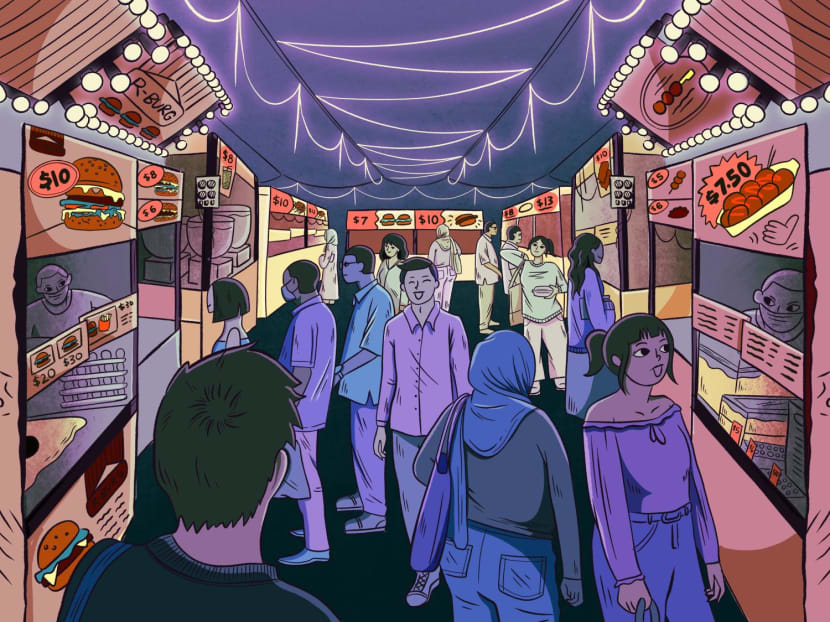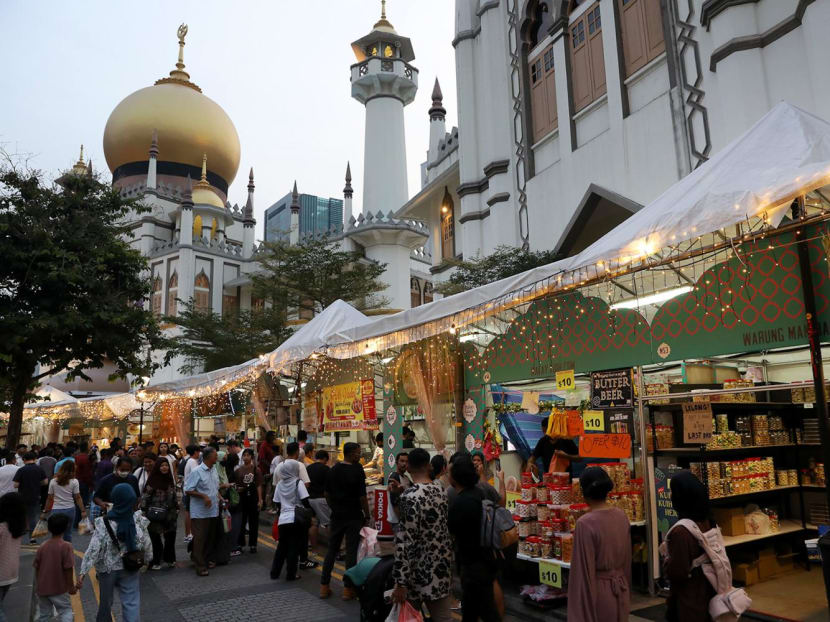The Big Read in short: Will S’pore’s pasar malam industry fade into the night?
SINGAPORE — Whenever a pasar malam pops up near his neighbourhood, Sengkang resident Gordon Chia would make it a point to visit it almost daily.

Besides the wide variety of goods available, festive bazaars and pasar malam provide an avenue for visitors to bond with families and friends. However, prices of the pasar malam offerings are escalating in recent years.
Each week, TODAY’s long-running Big Read series delves into the trends and issues that matter. This week, we look at why pasar malam and festive bazaars draw Singaporeans and the business of tendering for and organising these trade fairs, particularly as rising costs have eroded their pull. This is a shortened version of the full feature, which can be found here.
- Festive bazaars and pasar malam have long been a popular and common sight in Singapore, but skyrocketing rental prices have compounded overall rising costs, eroding their attractiveness
- Companies that organise bazaars point to how tender values — the amount they pay to People's Association to organise such fairs — add to costs
- Tender values make up at least 50 per cent of the evaluation criteria, while some tender documents even say full weightage is given to the tender sum
- Such tenders run into hundreds of thousands of dollars for those in the heartlands or over S$2million in the case of the Ramadan bazaar at Geylang Serai
- Organising companies, stallholders, consumers and business experts say it is worth relooking how tenders are awarded to tackle this issue of rising costs
SINGAPORE — Whenever a pasar malam pops up near his neighbourhood, Sengkang resident Gordon Chia would make it a point to visit it almost daily.
“It’s the variety of food, some of which you’ll hardly find elsewhere,” said the 35-year-old, speaking to TODAY on Thursday afternoon (April 20) at a pasar malam next to Punggol MRT Station in between bites of crispy-fried cuttlefish.
Though he acknowledged that prices of his beloved street food have gone up over the years, Mr Chia said he is still drawn to the variety offered and still buys them frequently to “support local businesses”.
On the other hand, a Yishun resident who wanted to be known only by his first name Kishan, 34, professed that his love for pasar malam, which began in his childhood, has faded through the years.
“When I was in secondary school or even as a younger adult (some years ago), I would make it a point to visit almost daily for vadai,” said Kishan, referring to a fried dough snack popular at night markets.
“But now, even though a pasar malam would appear near my place once in a while and I have to walk through it to get to work or go home, I rarely buy anything,” he said, attributing it to costliness.
“Sometimes, I don’t even take a look around when I walk past.”
For decades, trade fairs such as festive bazaars and neighbourhood pasar malam — Malay for night market — have been a common sight in Singapore.
While these trade fairs took a hiatus during the Covid-19 years, they have since made a return and one organiser has even listed 11 such fairs at various housing estates across the island from this weekend till July this year, each lasting 14 to 16 days.
These fairs typically constitute a mishmash of stalls selling anything from clothes, toys to plants, and most popularly, food.

Vendors, organisers and customers told TODAY that beyond these goods, the pasar malam provides an avenue for visitors to bond with families and friends.
While these fairs have undergone some positive changes over the years, such as being generally cleaner and of better layouts, other developments are not so welcome. One issue that sticks out in particular, as highlighted by Mr Chia and Kishan, is the escalating prices of the pasar malam offerings.
Vendors interviewed by TODAY blamed the price increases on rising costs, of which rent is a significant one. They cited how daily rates have doubled in some cases since pre-Covid-19 years, and can cost S$400 a day now.
WHY IT MATTERS
The issue of rental rates drew much public attention yet again recently, as the base rental prices at this year's Ramadan Bazaar at Geylang Serai reached as high as about S$25,000 for some stalls, excluding miscellaneous costs, for the 36-day festive event.
Amid the eyebrow-raising figures, Mr Mohamed Mustaffa Shah Jehan, one of the co-organisers of the bazaar said he felt that the public was unaware of the high costs involved in organising the fair.

The founder of Enniche Global Trading told TODAY that the cost was in the region of almost S$5 million, of which about just under half constituted the tender sum. This refers to the S$2.26 million that organisers had to pay to People’s Association (PA) for the rights to organise the event.
As for pasar malam in the heartlands, a 20-day fair at Our Tampines Hub with 50 stalls that ended on Wednesday (April 19) had a tender value of S$171,000, according to publicly available information on the government procurement site Gebiz.
Meanwhile, a 22-day fair at Sembawang West with about 110 stalls that ended on April 10 had a tender value of “over S$100,000'', according to one of its co-organisers Abdul Rani Mustafa, founder of Adex International.
THE BIG PICTURE
While trade fairs offer visitors a sense of novelty, one key attraction is the accessibility of its offerings — both in terms of price and convenience, said vendors and customers alike.
However, shifts in market conditions are eroding the attractiveness of pasar malam.
Ms May Oh, 62, who has been selling cheap household products at pasar malam for 15 years, told TODAY: “Last time selling things at pasar malam was enough. I could even raise two children and send them to school.
“Now it’s barely enough for me and my husband,” said Ms Oh, whose two children are now working after graduating from university.
She attributed the change in fortune to the rising rent and overall costs, as well as the shrinking customer base.
Vendors, bazaar organisers and a business expert suggested that PA relook how it awards the tender, given that the tender price forms a significant part of overall costs.
An evaluation mechanism that emphasises tender value might lead to a bidding war, with additional costs trickling downstream through rental rates and eventually prices of goods sold.
“I think, if nothing is done, pasar malam might not be around anymore in three to four years’ time,” said Mr Fraze Tan Boon Leng, 35, a third-generation owner of Hock Kee Birds Nest drink stall, a family business that has been operating at night markets since the 1980s.
He said that if vendors try to absorb the additional costs, it would cut into their profit margin. On the other hand, passing the cost increase on to customers would turn some away, effectively impacting the bottom line of the stallholders.
Either way, it would threaten business sustainability.

THE BOTTOMLINE
To organise a pasar malam, interested companies would first have to submit a tender to PA and indicate a tender value. If successful, the company would then have to pay the tender value to PA.
Replying to a parliamentary question on Friday (April 21), Minister for Culture, Community and Youth Edwin Tong said that trade fairs are organised through an open tender process to appoint a professional fair operator to manage and operate the event.
The successful tenderer will set the rent “based on market rates”, said Mr Tong, whose ministry oversees PA.
In the case of the Geylang Serai Ramadan bazaar, the award did not go to the bidder with the highest price, he added.
Mr Mustaffa said that in previous years, for the Geylang Serai Ramadan bazaar, 50 per cent of the evaluation weightage was given to the tender price, while the remaining 50 was based on other qualitative considerations such as the proposed concept for the bazaar and the organiser’s track record.
This year, the tender sum was given a higher weightage in the evaluation process, he added.
PA did not respond to TODAY's queries asking for further details on the tender evaluation process of pasar malam in general, how prices have changed over the years as well as a list of companies that have successfully won tenders to organise trade fairs across the country.
However, a spokesperson of the organisation told TODAY that "all the proceeds" from this year’s Geylang Serai Ramadan bazaar "are used for the community".
Meanwhile, PA's tender documents for at least three pasar malam sites in the heartlands seen by TODAY indicate that full weightage is given to the tender sum when evaluating it.
However, the tender documents also stated that the organising committee is not obligated to accept “the highest or any tender offer”.
Though they acknowledge that larger market forces are at play in causing the overall increase in costs, stall vendors, organisers and customers are still holding out hope that something can be done with regards to the tender process.
“After all, trade fairs are organised for the people, right?” said Kishan the Yishun resident.
Professor Sharon Ng, who heads the marketing division at Nanyang Business School, Nanyang Technological University, summed up the various calls to relook the tender process succinctly.
“Reduce the weightage on price in the tender decision. Relook why PA is organising a bazaar. Is it purely a revenue generating tool or are there other reasons?” she said.
“If there are other reasons, include other considerations (such as how the proposal is helping PA to achieve its other goals) when evaluating the tender.”











